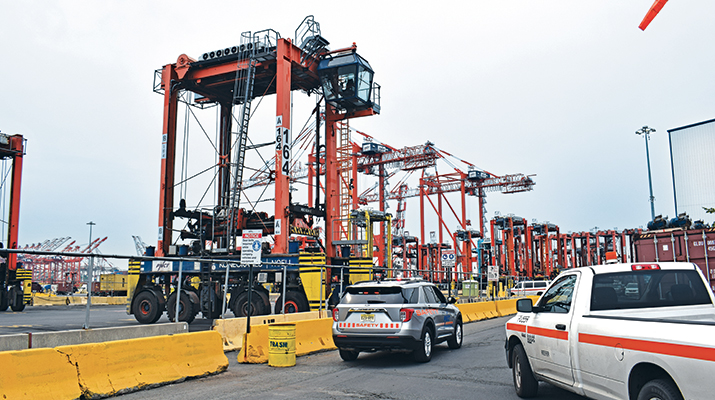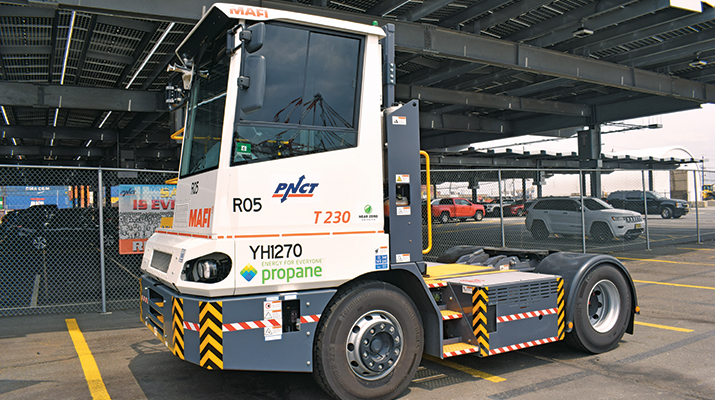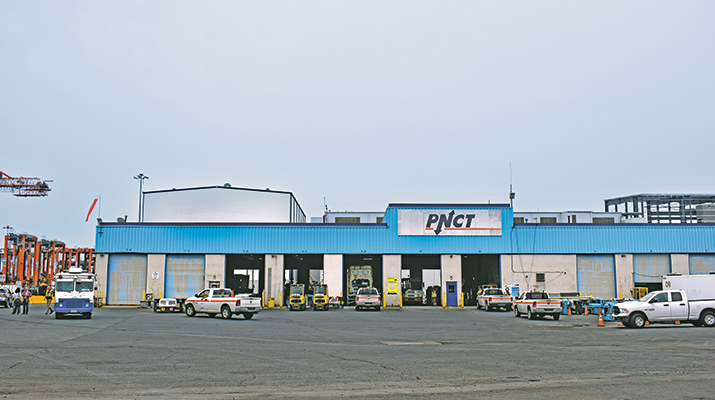How propane tractors are transforming port logistics

The Port Newark Container Terminal is adding propane-fueled port tractors to its operation and plans to keep expanding its use of propane. (Photo by LP Gas staff)
After announcing plans in 2022 to use propane-powered port tractors, the Port Newark Container Terminal (PNCT) in Newark, New Jersey, has begun the transition away from diesel units.
Even before this undertaking, the PNCT already used propane in part of its operations, chiefly in its forklifts. Because PNCT used propane, it had a propane retailer to work with for this expansion – Suburban Propane, headquartered in Whippany, New Jersey.
So far, the PNCT has replaced 20 of its diesel-powered tractors with propane-powered units, plans to replace 20 more by the end of the year and will phase out the final five diesel-fueled units in 2025. When the transition is complete, the port will have 45 propane tractors and zero running on diesel.
At ports, workers use these tractors to move shipping containers.
The PNCT is one of the largest infrastructure projects in New Jersey. It occupies 272 acres and handles more than 1.3 million 20-ft. equivalent containers annually.
The tractors are manufactured by MAFI, a German-based company that develops and manufactures heavy-duty port vehicles. MAFI is one of the first manufacturers to develop propane-fueled port tractors. The PNCT has had a working relationship with MAFI since 2017, when PNCT brought the company in to supply trailers.

The new propane-fueled port tractors are efficient, clean and low-cost alternatives to the previously used diesel-fueled units. (Photo by LP Gas staff)
Departing from diesel
According to Charlie Ferlisi, director of engineering and equipment services, PNCT chose propane and its clean-burning properties out of a desire to lower its emissions and create a healthier environment for its employees. The port’s operators run the tractors seven days a week, 16 hours a day.
“How we reduce our emissions is absolutely important,” says Ferlisi.
John Barnett, autogas sales representative of Suburban Propane, which supplies the propane to the PNCT, also explains that the federal government has been targeting ports specifically to get them to lower their emissions, and because electric vehicles aren’t in use in many ports, propane is the best option. The ports that use electric vehicles often use propane generators to charge them, Barnett says.
Tucker Perkins, president and CEO of the Propane Education & Research Council (PERC), emphasizes the benefits of switching from diesel to propane, citing that propane is better for the environment, for workers, for the community and for the port’s finances.
According to Perkins, workers come home healthier after their shifts when they work with propane because of its lower emissions.
Ferlisi agrees on the benefits to workers, stating, “It’s also a cleaner solution. Our operators are operating these tractors seven days a week, 16 hours a day. So, it’s very important that they are healthy in their environment.”
Additionally, the port is realizing cost benefits with the new tractors.
“These tractors cost 40 percent less than their electric counterparts,” Perkins says.
According to Ferlisi, the propane tractors also perform well, with 270 horsepower and 565 pounds per ft. of torque, “which is significant compared to the tractors we had previously,” he says.
Another advantage of propane over other fuels is that there is no risk of spillage with propane equipment, explains Barnett. This characteristic makes propane especially attractive for operations near the water like ports, because they can’t risk anything contaminating the water.
Cleaner communities
A common thread among those involved in the transition is the importance of the Newark and New Jersey communities.
“Our commitment to our communities matters to us,” says Jim Pelliccio, president and CEO of PNCT.
“It’s about our community … being able to live in cleaner air,” says Mike Bozza, deputy director of the Port Authority of New York and New Jersey.
Sydney Eick, director of sales for MAFI USA, emphasizes that propane is 99 percent cleaner than diesel.
A unique fueling station
Transitioning from diesel to propane isn’t always a simple task.
A lot of work went into the PNCT’s transition. According to Barnett, the transition involved several meetings between the PNCT, Suburban Propane and the state of New Jersey.
The fueling station was a particularly challenging obstacle in introducing more propane into PNCT. Due to union rules and the fact that the PNCT leases its land, it couldn’t install a permanent propane fueling station. The port had to build a hybrid station that could be moved like a temporary trailer, but with the fueling capacity of a permanent station.
So, the PNCT worked with Gas Equipment Co. (GEC) in Carrollton, Texas, and Exosent Engineering in College Station, Texas, to create a first-of-its-kind fueling trailer.
Gene Morrison, dispensing systems product manager for GEC, and Kevin Pruitt, vice president of sales for GEC, credited UV Doron, president and co-founder of Exosent Engineering, for providing the engineering knowledge to make the propane fueling station possible, legal and Department of Transportation certified.
According to Morrison and Pruitt, GEC is building more hybrid fueling stations. The company plans to build them for fleet applications to use while their permanent stations are being built, and for emergency response, where portable fuel is crucial. If deployed for such a need, the fueling station can be moved and redeployed elsewhere once the fleet’s permanent station has been built or the emergency has cleared.
“This [trailer station] has helped us reduce downtime in operation by having a one-stop shop operation for fueling,” Ferlisi says. “It also does increase the productivity of our terminal tractors without having to stop them for fuel.”
With the on-site fueling station, he adds, PNCT workers can easily refuel the tractors between shifts.

The PNCT has been using propane in part of its operation, including in forklifts, with Suburban Propane supplying the fuel. (Photo by LP Gas staff)
Looking ahead
Ferlisi and Pelliccio say the PNCT plans to continue expanding and using propane to fuel more applications, including its straddle carriers, which make up the bulk of its operation. Ports also use these carriers to move containers. Specifically, the PNCT is working on implementing propane-hybrid straddle carriers, according to Ferlisi.
“We are currently looking at ways we can implement propane in other aspects of our operation,” Ferlisi explains. “It’s going to be an ongoing operation.
“The idea is to see where we can implement propane, wherever applicable,” he adds.
Though the PNCT’s push to further implement propane into its operation has been progressing, it’s taking time to develop and transition to the new propane technology.
“The biggest challenge we have is getting the OEMs to cooperate and make sure they have the right infrastructure and designs to implement the specifications needed for our operation,” says Ferlisi. “But I think they’re all coming along to realizing that it’s not just one solution. There are going to be multiple solutions that help us with this environmental challenge that we have.
“We are lucky to say that they are all cooperating and giving it a shot,” Ferlisi adds.
According to Bozza, the Port Authority’s goal is to eliminate greenhouse gas emissions entirely by 2050. In the meantime, he says, the goal is to reduce emissions by 50 percent by 2030.
MAFI only debuted its first propane-powered port tractor in September 2022, so the PNCT is an early player in the propane tractor space. As the government continues to push ports away from diesel, and as ports like the PNCT demonstrate the success of propane, more ports across the country will make the switch from diesel to propane, industry leaders say.
MAFI is also working on a street-legal propane-fueled tractor that operators can drive on the road, giving port workers more flexibility in their operations.
Celebrating success
To celebrate the PNCT’s transition from diesel to propane, PERC presented the terminal with the Energy for Everyone Hero Award.
Perkins presented the award to Pelliccio during a ceremony at the port, with Ferlisi, Bozza, Barnett, Eick, Morrison, Pruitt and others, including Michael Stivala, president and CEO of Suburban Propane, in attendance.
In presenting the award to Pelliccio, Perkins commended the courage that it took for the port to break the status quo and move on from diesel. Pelliccio thanked the Port Authority; PERC; the International Longshoremen’s Association; Ras Baraka, the mayor of Newark; and Steve Kaminski of the National Propane Gas Association.
The PNCT’s partnership with PERC is evident by PERC’s “Energy for Everyone – Propane” logo emblazoned on the tractors.
Earlier this year, PERC also presented Fisher Vineyards in California and Broward County Transit in Florida with the 2024 Energy for Everyone Hero Award for their own propane initiatives.
















